荀子劝学双语版word精品
荀子劝学篇全文
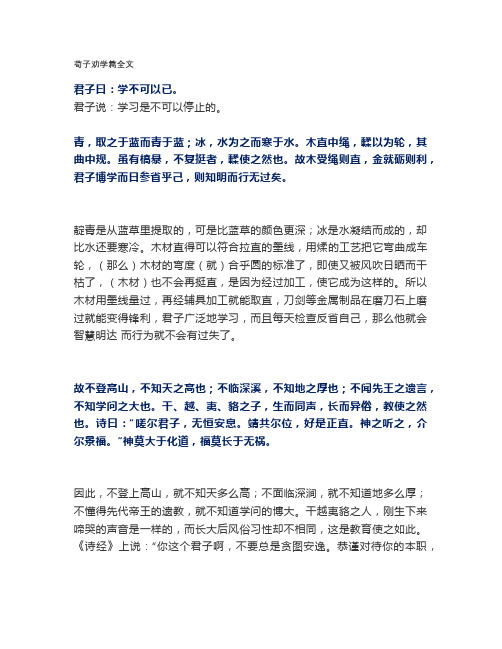
荀子劝学篇全文君子曰:学不可以已。
君子说:学习是不可以停止的。
青,取之于蓝而青于蓝;冰,水为之而寒于水。
木直中绳,輮以为轮,其曲中规。
虽有槁暴,不复挺者,輮使之然也。
故木受绳则直,金就砺则利,君子博学而日参省乎己,则知明而行无过矣。
靛青是从蓝草里提取的,可是比蓝草的颜色更深;冰是水凝结而成的,却比水还要寒冷。
木材直得可以符合拉直的墨线,用煣的工艺把它弯曲成车轮,(那么)木材的弯度(就)合乎圆的标准了,即使又被风吹日晒而干枯了,(木材)也不会再挺直,是因为经过加工,使它成为这样的。
所以木材用墨线量过,再经辅具加工就能取直,刀剑等金属制品在磨刀石上磨过就能变得锋利,君子广泛地学习,而且每天检查反省自己,那么他就会智慧明达而行为就不会有过失了。
故不登高山,不知天之高也;不临深溪,不知地之厚也;不闻先王之遗言,不知学问之大也。
干、越、夷、貉之子,生而同声,长而异俗,教使之然也。
诗曰:“嗟尔君子,无恒安息。
靖共尔位,好是正直。
神之听之,介尔景福。
”神莫大于化道,福莫长于无祸。
因此,不登上高山,就不知天多么高;不面临深涧,就不知道地多么厚;不懂得先代帝王的遗教,就不知道学问的博大。
干越夷貉之人,刚生下来啼哭的声音是一样的,而长大后风俗习性却不相同,这是教育使之如此。
《诗经》上说:“你这个君子啊,不要总是贪图安逸。
恭谨对待你的本职,爱好正直的德行。
神明听到这一切,就会赐给你洪福祥瑞。
”精神修养没有比受道德熏陶感染更大了,福分没有比无灾无祸更长远了。
吾尝终日而思矣,不如须臾之所学也;吾尝跂而望矣,不如登高之博见也。
登高而招,臂非加长也,而见者远;顺风而呼,声非加疾也,而闻者彰。
假舆马者,非利足也,而致千里;假舟楫者,非能水也,而绝江河。
君子生非异也,善假于物也。
我曾经整天思索,(却)不如片刻学到的知识(多);我曾经踮起脚远望,(却)不如登到高处看得广阔。
登到高处招手,胳膊没有比原来加长,可是别人在远处也看见;顺着风呼叫,声音没有变的洪亮,可是听的人听得很清楚。
《荀子》劝学篇原文及译文对照打印版

《荀子》劝学君子曰:学不可以已。
青、取之于蓝,而青于蓝;冰、水为之,而寒于水。
木直中绳,輮以为轮,其曲中规,虽有槁暴,不复挺者,輮使之然也。
故木受绳则直,金就砺则利,君子博学而日参省乎己,则知明而行无过矣。
译文君子说:学习不能够停止不前。
靛青是从蓼蓝中提取而来的,但比蓼蓝更青;冰是由水凝固而成的,但比水还要寒冷。
木材挺直的如同木工的墨线,但用火烘烤,就可使它弯曲,进而做成车轮,它的曲度就像与圆规画的一样,即使再经过烈火的烘烤,太阳的暴晒,它也不能再恢复原样了,这是熏烤弯曲使它变成这样的啊。
所以木材经过墨线加工才能取直,金属刀剑在磨刀石上磨过才能锋利,君子学习广泛,而又能每天检查反省自己,那就会见识高明而行为不会犯错误了。
故不登高山,不知天之高也;不临深溪,不知地之厚也;不闻先王之遗言,不知学问之大也。
干、越、夷、貉之子,生而同声,长而异俗,教使之然也。
诗曰:“嗟尔君子,无恒安息。
靖共尔位,好是正直。
神之听之,介尔景福。
”神莫大于化道,福莫长于无祸。
译文所以,不登上高山,就不知道天的高远;不亲临深溪,就不知道大地的厚度;没有听到过前代圣王的遗言,就不知道学问的渊博。
干国、越国,夷族和貊族的孩子,生下来的时候,他们的哭声是一样的,但长大后习俗却不同了,这是因为后天的教化而使他们这样的啊。
《诗经》上说:“你们这些君子啊,不要总是贪图安逸,要安守你的职位,爱好正直的德行。
上帝知道了,就会赐与你极大的幸福。
”融化于圣贤的道德的精神修养就是最高明的,没灾没祸的幸福就是最持久的。
吾尝终日而思矣,不如须臾之所学也。
吾尝跂而望矣,不如登高之博见也。
登高而招,臂非加长也,而见者远;顺风而呼,声非加疾也,而闻者彰。
假舆马者,非利足也,而致千里;假舟楫者,非能水也,而绝江河。
君子生非异也,善假于物也。
译文我经常整天思考,但不如学习片刻所获得的教益;我曾经踮起脚远望,但不如登上高处看得广阔。
登上高处招手,手臂并没有加长,但远处的人就能看见。
荀子《劝学》原文及翻译
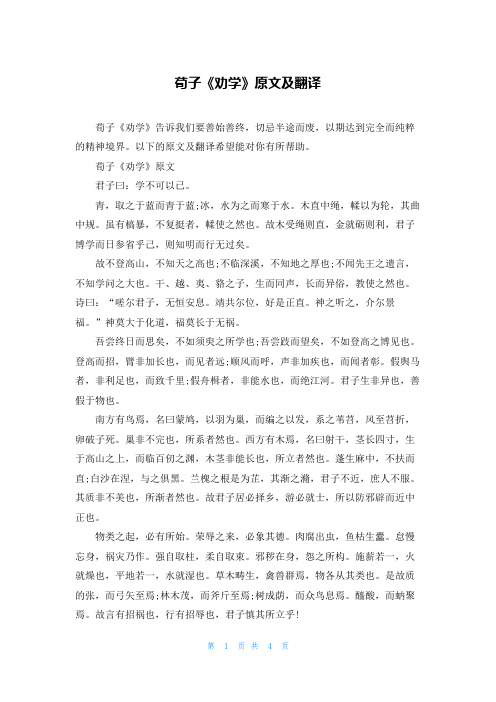
荀子《劝学》原文及翻译荀子《劝学》告诉我们要善始善终,切忌半途而废,以期达到完全而纯粹的精神境界。
以下的原文及翻译希望能对你有所帮助。
荀子《劝学》原文君子曰:学不可以已。
青,取之于蓝而青于蓝;冰,水为之而寒于水。
木直中绳,輮以为轮,其曲中规。
虽有槁暴,不复挺者,輮使之然也。
故木受绳则直,金就砺则利,君子博学而日参省乎己,则知明而行无过矣。
故不登高山,不知天之高也;不临深溪,不知地之厚也;不闻先王之遗言,不知学问之大也。
干、越、夷、貉之子,生而同声,长而异俗,教使之然也。
诗曰:“嗟尔君子,无恒安息。
靖共尔位,好是正直。
神之听之,介尔景福。
”神莫大于化道,福莫长于无祸。
吾尝终日而思矣,不如须臾之所学也;吾尝跂而望矣,不如登高之博见也。
登高而招,臂非加长也,而见者远;顺风而呼,声非加疾也,而闻者彰。
假舆马者,非利足也,而致千里;假舟楫者,非能水也,而绝江河。
君子生非异也,善假于物也。
南方有鸟焉,名曰蒙鸠,以羽为巢,而编之以发,系之苇苕,风至苕折,卵破子死。
巢非不完也,所系者然也。
西方有木焉,名曰射干,茎长四寸,生于高山之上,而临百仞之渊,木茎非能长也,所立者然也。
蓬生麻中,不扶而直;白沙在涅,与之俱黑。
兰槐之根是为芷,其渐之滫,君子不近,庶人不服。
其质非不美也,所渐者然也。
故君子居必择乡,游必就士,所以防邪辟而近中正也。
物类之起,必有所始。
荣辱之来,必象其德。
肉腐出虫,鱼枯生蠹。
怠慢忘身,祸灾乃作。
强自取柱,柔自取束。
邪秽在身,怨之所构。
施薪若一,火就燥也,平地若一,水就湿也。
草木畴生,禽兽群焉,物各从其类也。
是故质的张,而弓矢至焉;林木茂,而斧斤至焉;树成荫,而众鸟息焉。
醯酸,而蚋聚焉。
故言有招祸也,行有招辱也,君子慎其所立乎!积土成山,风雨兴焉;积水成渊,蛟龙生焉;积善成德,而神明自得,圣心备焉。
故不积跬步,无以至千里;不积小流,无以成江海。
骐骥一跃,不能十步;驽马十驾,功在不舍。
锲而舍之,朽木不折;锲而不舍,金石可镂。
(完整word版)劝学原文+注音
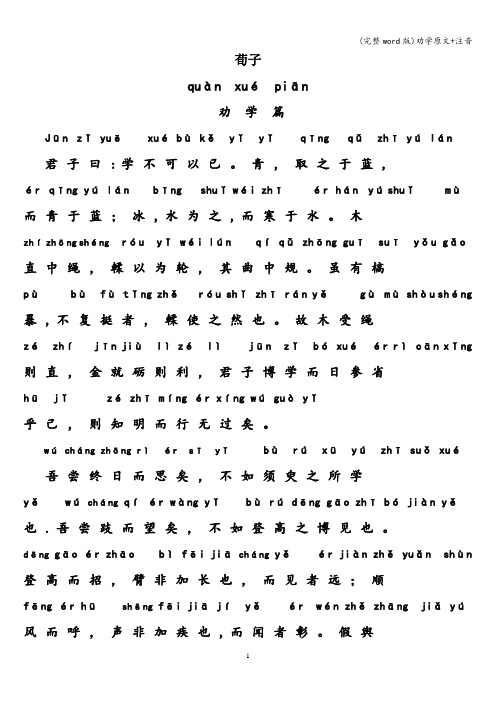
荀子quàn xué piān劝学篇Jūn zǐ yuē xué bù kě yǐ yǐqīng qǔ zhī yú lán君子曰:学不可以已。
青,取之于蓝,ér qīng yúlán bīng shuǐwéi zhīér hán yúshuǐmù而青于蓝;冰,水为之,而寒于水。
木zhízhōng shéng róu yǐ wéi lún qí qǔ zhōng guīsuīyǒu gǎo 直中绳,輮以为轮,其曲中规。
虽有槁pù bù fù tǐng zhě róu shǐ zhī rán yěgùmùshòu shéng 暴,不复挺者,輮使之然也。
故木受绳zézhíjīn j iùlìzélì jūn zǐ bó xuéér rì cān xǐng 则直,金就砺则利,君子博学而日参省hū jǐzézhīmíngér xíng wú guò yǐ乎己,则知明而行无过矣。
wú cháng zhōng rìér sī yǐbù rú xū yú zhī suǒ xué吾尝终日而思矣,不如须臾之所学yě wú cháng qíér wàng yǐbùrúdēng gāo zhībójiàn yě也.吾尝跂而望矣,不如登高之博见也。
荀子中英文对照
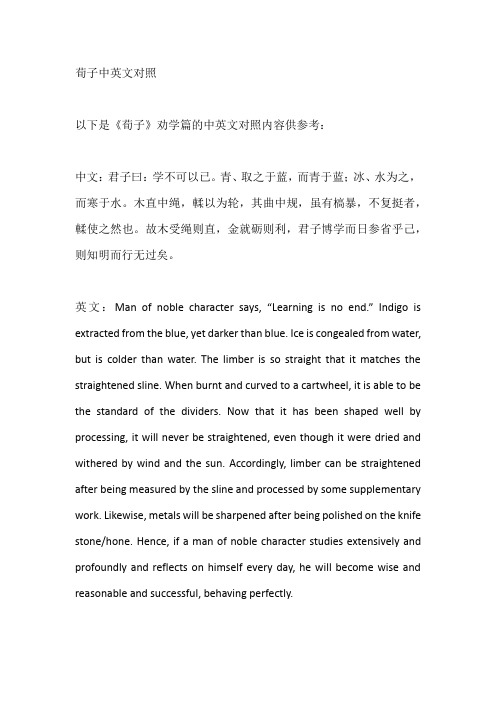
荀子中英文对照以下是《荀子》劝学篇的中英文对照内容供参考:中文:君子曰:学不可以已。
青、取之于蓝,而青于蓝;冰、水为之,而寒于水。
木直中绳,輮以为轮,其曲中规,虽有槁暴,不复挺者,輮使之然也。
故木受绳则直,金就砺则利,君子博学而日参省乎己,则知明而行无过矣。
英文:Man of noble character says, “Learning is no end.” Indigo is extracted from the blue, yet darker than blue. Ice is congealed from water, but is colder than water. The limber is so straight that it matches the straightened sline. When burnt and curved to a cartwheel, it is able to be the standard of the dividers. Now that it has been shaped well by processing, it will never be straightened, even though it were dried and withered by wind and the sun. Accordingly, limber can be straightened after being measured by the sline and processed by some supplementary work. Likewise, metals will be sharpened after being polished on the knife stone/hone. Hence, if a man of noble character studies extensively and profoundly and reflects on himself every day, he will become wise and reasonable and successful, behaving perfectly.中文:吾尝终日而思矣,不如须臾之所学也。
荀子 劝学 原文
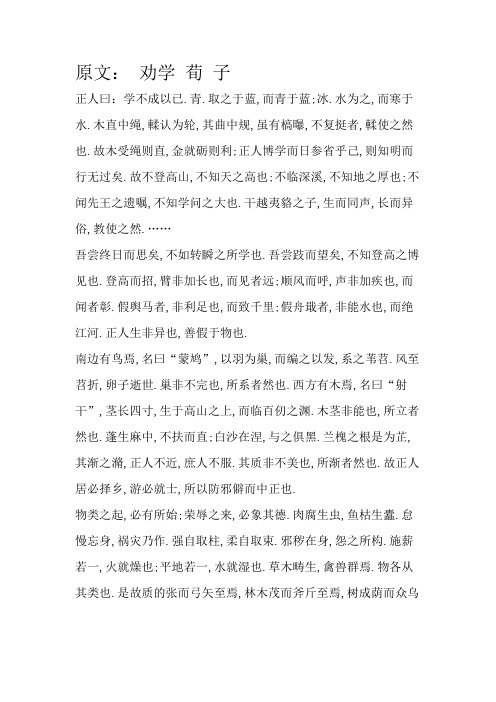
原文:劝学荀子正人曰:学不成以已.青.取之于蓝,而青于蓝;冰.水为之,而寒于水.木直中绳,輮认为轮,其曲中规,虽有槁曝,不复挺者,輮使之然也.故木受绳则直,金就砺则利;正人博学而日参省乎己,则知明而行无过矣.故不登高山,不知天之高也;不临深溪,不知地之厚也;不闻先王之遗嘱,不知学问之大也.干越夷貉之子,生而同声,长而异俗,教使之然.……吾尝终日而思矣,不如转瞬之所学也.吾尝跂而望矣,不知登高之博见也.登高而招,臂非加长也,而见者远;顺风而呼,声非加疾也,而闻者彰.假舆马者,非利足也,而致千里;假舟戢者,非能水也,而绝江河.正人生非异也,善假于物也.南边有鸟焉,名曰“蒙鸠”,以羽为巢,而编之以发,系之苇苕.风至苕折,卵子逝世.巢非不完也,所系者然也.西方有木焉,名曰“射干”,茎长四寸,生于高山之上,而临百仞之渊.木茎非能也,所立者然也.蓬生麻中,不扶而直;白沙在涅,与之俱黑.兰槐之根是为芷,其渐之滫,正人不近,庶人不服.其质非不美也,所渐者然也.故正人居必择乡,游必就士,所以防邪僻而中正也.物类之起,必有所始;荣辱之来,必象其德.肉腐生虫,鱼枯生蠹.怠慢忘身,祸灾乃作.强自取柱,柔自取束.邪秽在身,怨之所构.施薪若一,火就燥也;平地若一,水就湿也.草木畴生,禽兽群焉.物各从其类也.是故质的张而弓矢至焉,林木茂而斧斤至焉,树成荫而众乌鸟焉,醯酸而蚋聚焉.故言有招祸也,行有招辱也,正人慎其所立乎!积土成山,风雨兴焉;积水成渊,蛟龙生焉;积善成德,而神明自得,圣心备焉.故不积蹞步,无以至千里;不积小流,无以成江海.骑骥一跃,不克不及十步;驽马十驾,功在不舍.锲而舍之,朽木不折;锲而不舍,金石可镂.螾无帮凶之利,筋骨之强,上食埃土,下饮鬼域,居心一也.蟹六跪而二螯,非蛇蟮之穴,无可寄讬者,居心躁也.是故无冥冥之志者,无昭昭之明;无惛惛之事者,无赫赫之功.行衢道不至,事两君者不容.目不克不及两视而明,耳不克不及两听聪.螣蛇无足而飞,梧鼠五技而穷.诗曰:“尸鸠在桑,其子七兮.淑人正人,其仪一兮.其仪一兮.心如结兮.”故正人结于一也.昔者瓠巴鼓瑟,而流鱼出听;伯牙鼓琴,而六马仰秣.故声无小而不闻,行无隐而不形.玉在山而草润,渊生珠而崖不枯.为善不积邪?安有不闻者乎?学恶乎始?恶乎终?曰:其数则始乎诵经,终乎读礼;其义则始乎为士,终乎为圣人,真积力久则入,学至乎没尔后止也.故学数有终,若其义则不成转瞬舍也.为之,人也;舍之,禽兽也.故书者,政事之纪也;诗者,中声之所止也;礼者,法之大分,类之法纪也.故学至乎礼而止矣.夫是之谓道德之极.礼之敬文也,乐之中和也,诗书之博也,春秋之微也,在寰宇之间者毕矣.正人之学也,入乎耳,箸乎心,布乎四体,形乎动静.端而言,蝡而动,一可认为轨则.小人之学也,入乎耳,出乎口.口耳之间则四寸耳.曷足以美七尺之躯哉!古之学者为己,今之学者为人.正人之学也美其身,小人之学也认为禽犊.故不问而告谓之傲,问一而告二谓之囋.傲,非也,囋.非也;正人如向矣.。
《劝学》荀子原文及翻译
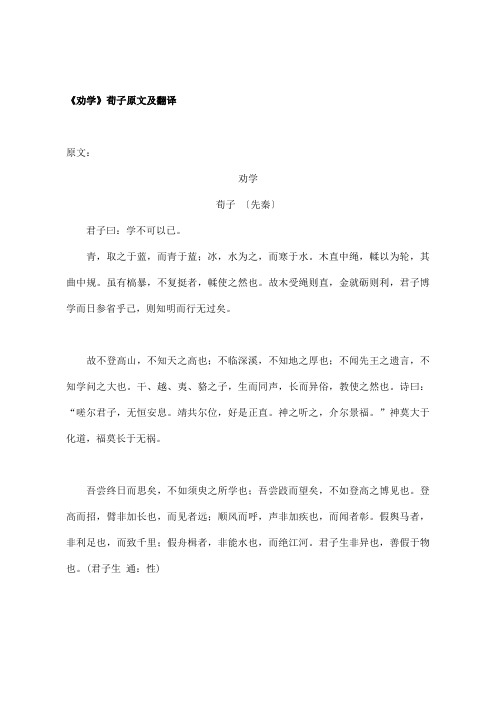
《劝学》荀子原文及翻译原文:劝学荀子〔先秦〕君子曰:学不可以已。
青,取之于蓝,而青于蓝;冰,水为之,而寒于水。
木直中绳,輮以为轮,其曲中规。
虽有槁暴,不复挺者,輮使之然也。
故木受绳则直,金就砺则利,君子博学而日参省乎己,则知明而行无过矣。
故不登高山,不知天之高也;不临深溪,不知地之厚也;不闻先王之遗言,不知学问之大也。
干、越、夷、貉之子,生而同声,长而异俗,教使之然也。
诗曰:“嗟尔君子,无恒安息。
靖共尔位,好是正直。
神之听之,介尔景福。
”神莫大于化道,福莫长于无祸。
吾尝终日而思矣,不如须臾之所学也;吾尝跂而望矣,不如登高之博见也。
登高而招,臂非加长也,而见者远;顺风而呼,声非加疾也,而闻者彰。
假舆马者,非利足也,而致千里;假舟楫者,非能水也,而绝江河。
君子生非异也,善假于物也。
(君子生通:性)南方有鸟焉,名曰蒙鸠,以羽为巢,而编之以发,系之苇苕,风至苕折,卵破子死。
巢非不完也,所系者然也。
西方有木焉,名曰射干,茎长四寸,生于高山之上,而临百仞之渊,木茎非能长也,所立者然也。
蓬生麻中,不扶而直;白沙在涅,与之俱黑。
兰槐之根是为芷,其渐之滫,君子不近,庶人不服。
其质非不美也,所渐者然也。
故君子居必择乡,游必就士,所以防邪辟而近中正也。
物类之起,必有所始。
荣辱之来,必象其德。
肉腐出虫,鱼枯生蠹。
怠慢忘身,祸灾乃作。
强自取柱,柔自取束。
邪秽在身,怨之所构。
施薪若一,火就燥也,平地若一,水就湿也。
草木畴生,禽兽群焉,物各从其类也。
是故质的张,而弓矢至焉;林木茂,而斧斤至焉;树成荫,而众鸟息焉。
醯酸,而蜹聚焉。
故言有招祸也,行有招辱也,君子慎其所立乎!积土成山,风雨兴焉;积水成渊,蛟龙生焉;积善成德,而神明自得,圣心备焉。
故不积跬步,无以至千里;不积小流,无以成江海。
骐骥一跃,不能十步;驽马十驾,功在不舍。
锲而舍之,朽木不折;锲而不舍,金石可镂。
蚓无爪牙之利,筋骨之强,上食埃土,下饮黄泉,用心一也。
蟹六跪而二螯,非蛇鳝之穴无可寄托者,用心躁也。
荀子劝学原文全文及译文

荀子劝学原文全文及译文【原文1】君子曰:学不可以已。
青,取之于蓝,而青于蓝;冰,水为之,而寒于水。
木直中绳,輮以为轮,其曲中规,虽有槁暴,不复挺者,輮使之然也。
故木受绳则直,金就砺则利,君子博学而日参省乎己,则知明而行无过矣。
故不登高山,不知天之高也;不临深溪,不知地之厚也;不闻先王之遗言,不知学问之大也。
干、越、夷、貉之子,生而同声,长而异俗,教使之然也。
诗曰:“嗟尔君子,无恒安息。
靖共尔位,好是正直。
神之听之,介尔景福。
”神莫大于化道,福莫长于无祸。
【译解】君子告诫求学的人:求学的中途是不能停下前进的脚步的。
像青这种原料,是从蓝草中提取出来的,却比蓝草更青;冰是水凝结而成的,却比水更寒冷;木头经过墨线变直,也可以设计成圆圆的轮子,曲折也是符合规矩,即使反复曝晒,也不再变形,设计让它变成这样了。
所以木头经过墨线,就能变直;金属做的工具经过磨刀石,就能变锋利;君子懂得多,还每天在实践中验证,那他就会让学到的东西,变得真明白,做事就不会犯错了。
所以说没有登过高山,就没有对天之高的真实感受;没有亲临深溪,就没有对地之厚的真实感受;没有听过先王说过的话,就不会明白先王的学问达到的高度与深度。
干、越、夷、貉的后代,刚出生时发出的声音并没有什么不同,但长大后差异就很大了,那是因为教育训练的不同造成的结果。
正如《诗》中说:“那些君子们啊,永远都没有好好安息。
要他们好好安息在自己的地方,除非是人人正直,因为他们只要知道有不好之事发生,就会努力地维护天下的福祉。
”一个人追求的最高境界莫过于化道为用,最大的幸福莫过于没有灾祸。
【原文2】吾尝终日而思矣,不如须臾之所学也。
吾尝跂而望矣,不如登高之博见也。
登高而招,臂非加长也,而见者远;顺风而呼,声非加疾也,而闻者彰。
假舆马者,非利足也,而致千里;假舟楫者,非能水也,而绝江河。
君子生非异也,善假于物也。
南方有鸟焉,名曰蒙鸠,以羽为巢,而编之以发,系之苇苕,风至苕折,卵破子死。
《劝学》完整版+注音+译文

qu àn xué pi ān劝 学 篇荀x ún 子z ǐ约公元前313年-公元前238年,名m íng 况ku àng,字卿q īng ,战国后期赵国人君jūn 子zǐ曰yuē:学xué不bù可kě以yǐ已yǐ。
青qīng ,取qǔ之zhī于yú蓝lán 而ér 青qīng 于yú蓝lán ;冰bīng ,水shuǐ为wéi 之zhī而ér 寒hán 于yú水shuǐ。
木mù直zhí中zhōng 绳shéng ,輮róu (左zuǒ应yìng 为wéi “车chē”,原yuán 字zì已yǐ废fèi 除chú)以yǐ为wéi 轮lún ,其qí曲qǔ中zhōng 规guī。
虽suī有yǒu 槁gǎo 暴bào ,不bú复fù挺tǐng 者zhě,輮róu 使shǐ之zhī然rán 也yě。
故gù木mù受shòu 绳shéng 则zé直zhí,金jīn 就jiù砺lì则zé利lì,君子jūnzǐ博学bóxué而ér 日rì参cān 省shěng 乎hū己jǐ,则zé知zhī明míng 而ér 行háng 无wú过guò矣yǐ。
故gù不bù登高dēnggāo 山shān ,不知bùzhī天tiān 之zhī高gāo 也yě;不bù临lín 深shēn 溪xī,不知bùzhī地dì之zhī厚hòu 也yě;不bù闻wén 先王xiānwáng 之zhī遗言yíyán ,不知bùzhī学问xuéwèn 之zhī大dà也yě。
劝学中英文对照
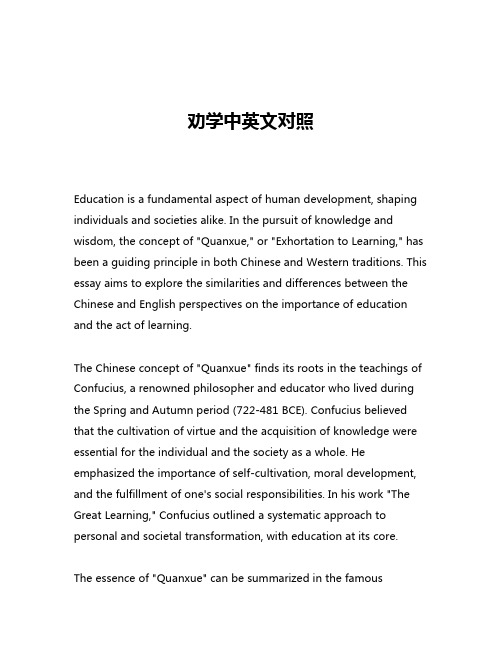
劝学中英文对照Education is a fundamental aspect of human development, shaping individuals and societies alike. In the pursuit of knowledge and wisdom, the concept of "Quanxue," or "Exhortation to Learning," has been a guiding principle in both Chinese and Western traditions. This essay aims to explore the similarities and differences between the Chinese and English perspectives on the importance of education and the act of learning.The Chinese concept of "Quanxue" finds its roots in the teachings of Confucius, a renowned philosopher and educator who lived during the Spring and Autumn period (722-481 BCE). Confucius believed that the cultivation of virtue and the acquisition of knowledge were essential for the individual and the society as a whole. He emphasized the importance of self-cultivation, moral development, and the fulfillment of one's social responsibilities. In his work "The Great Learning," Confucius outlined a systematic approach to personal and societal transformation, with education at its core.The essence of "Quanxue" can be summarized in the famousConfucian saying, "The essence of knowledge is, having it, to apply it; not having it, to confess your ignorance." This statement underscores the importance of not only acquiring knowledge but also the ability to put it into practice. Confucius believed that true learning was not merely the accumulation of facts, but the cultivation of wisdom and the ability to make informed decisions that benefit both the individual and the community.In the Western tradition, the concept of education and the exhortation to learning can be traced back to the ancient Greek philosophers, particularly Plato and Aristotle. Plato's renowned work, "The Republic," delves into the role of education in the development of an ideal society. Plato believed that education should not only impart knowledge but also cultivate the virtues and moral character of the individual. He envisioned a system of education that would produce citizens capable of contributing to the greater good of the state.Aristotle, on the other hand, emphasized the importance of practical wisdom and the application of knowledge in real-life situations. He believed that education should not only focus on the acquisition of theoretical knowledge but also on the development of practical skills and the ability to make sound judgments. Aristotle's concept of "Phronesis," or practical wisdom, is akin to the Confucian idea of applying knowledge to real-world situations.The Western tradition of education has also been heavily influenced by the Judeo-Christian heritage, particularly the emphasis on the pursuit of knowledge as a means of understanding the divine and one's role in the world. The Bible, for instance, encourages the acquisition of wisdom and the cultivation of a thirst for knowledge, as exemplified in the Book of Proverbs: "Get wisdom, get understanding; do not forget my words or turn away from them."In both the Chinese and Western traditions, the act of learning is not merely a means to an end, but a lifelong journey of personal and societal transformation. The "Quanxue" concept in China and the Western emphasis on the pursuit of knowledge and practical wisdom share a common thread: the belief that education is essential for the development of the individual and the betterment of society.However, there are also notable differences between the Chinese and Western approaches to education. The Chinese tradition, rooted in Confucianism, places a stronger emphasis on the social and moral aspects of learning, with the ultimate goal of cultivating virtuous individuals who can fulfill their societal responsibilities. In contrast, the Western tradition, influenced by the ancient Greek philosophers and the Judeo-Christian heritage, tends to have a more individualistic approach, focusing on the pursuit of knowledge and the development of practical wisdom for personal and professionaladvancement.Moreover, the Chinese tradition of "Quanxue" often emphasizes the importance of respect for authority, hierarchy, and the social order, whereas the Western tradition places a greater emphasis on critical thinking, individual autonomy, and the questioning of established norms.Despite these differences, both the Chinese and Western traditions share a common understanding of the transformative power of education and the importance of the pursuit of knowledge. In an increasingly globalized world, the cross-pollination of ideas and the mutual understanding of these diverse perspectives on education can lead to a richer and more comprehensive approach to learning and personal growth.In conclusion, the concept of "Quanxue" in Chinese tradition and the Western emphasis on the pursuit of knowledge and practical wisdom share a common foundation: the belief that education is essential for the development of the individual and the betterment of society. By exploring the nuances and differences between these two traditions, we can gain a deeper appreciation for the multifaceted nature of education and its role in shaping our personal and collective futures.。
劝学(荀子)全文拼音及注释(打印版)
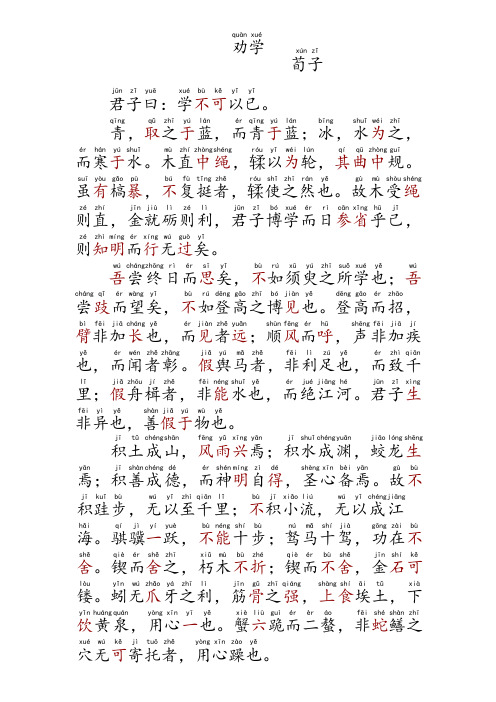
劝quàn 学xué荀xún 子zǐ君jūn 子zǐ曰yuē: 学xué不bù可kě以yǐ已yǐ。
青qīng , 取qǔ之zhī于yú蓝lán , 而ér 青qīng 于yú蓝lán ; 冰bīng , 水shuǐ为wéi 之zhī, 而ér 寒hán 于yú水shuǐ。
木mù直zhí中zhòng 绳shéng , róu 以yǐ为wéi 轮lún , 其qí曲qū中zhòng 规guī。
虽suī有yòu 槁gǎo 暴pù, 不bú复fù挺tǐng 者zhě, róu 使shǐ之zhī然rán 也yě。
故gù木mù受shòu 绳shéng 则zé直zhí, 金jīn 就jiù砺lì则zé利lì, 君jūn 子zǐ博bó学xué而ér 日rì参cān 省xǐng 乎hū己jǐ, 则zé知zhì明míng 而ér 行xíng 无wú过guò矣yǐ。
吾wú尝cháng 终zhōng 日rì而ér 思sī矣yǐ, 不bù如rú须xū臾yú之zhī所suǒ学xué也yě; 吾wú尝cháng 跂qǐ而ér 望wàng 矣yǐ, 不bù如rú登dēng 高gāo 之zhī博bó见jiàn 也yě。
荀子劝学的英译精选
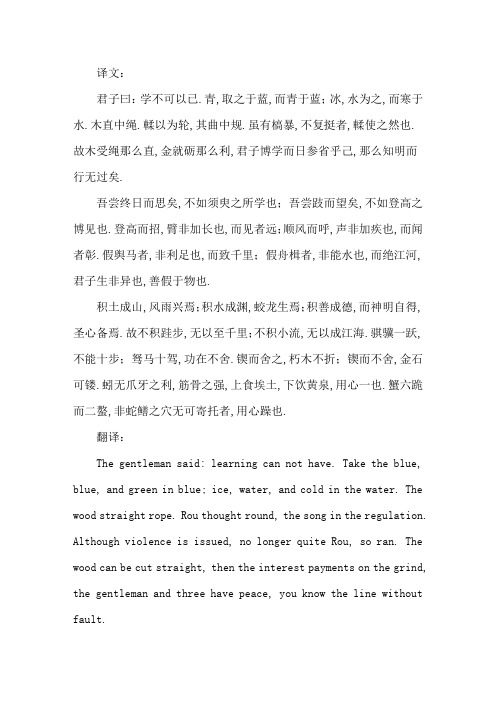
译文:君子曰:学不可以已.青,取之于蓝,而青于蓝;冰,水为之,而寒于水.木直中绳.輮以为轮,其曲中规.虽有槁暴,不复挺者,輮使之然也.故木受绳那么直,金就砺那么利,君子博学而日参省乎己,那么知明而行无过矣.吾尝终日而思矣,不如须臾之所学也;吾尝跂而望矣,不如登高之博见也.登高而招,臂非加长也,而见者远;顺风而呼,声非加疾也,而闻者彰.假舆马者,非利足也,而致千里;假舟楫者,非能水也,而绝江河,君子生非异也,善假于物也.积土成山,风雨兴焉;积水成渊,蛟龙生焉;积善成德,而神明自得,圣心备焉.故不积跬步,无以至千里;不积小流,无以成江海.骐骥一跃,不能十步;驽马十驾,功在不舍.锲而舍之,朽木不折;锲而不舍,金石可镂.蚓无爪牙之利,筋骨之强,上食埃土,下饮黄泉,用心一也.蟹六跪而二螯,非蛇鳝之穴无可寄托者,用心躁也.翻译:The gentleman said: learning can not have. Take the blue, blue, and green in blue; ice, water, and cold in the water. The wood straight rope. Rou thought round, the song in the regulation. Although violence is issued, no longer quite Rou, so ran. The wood can be cut straight, then the interest payments on the grind, the gentleman and three have peace, you know the line without fault.I tasted all day and thinking men, not even for a moment;I tasted the crawling and looking men, as the Bo see also up. Climb the move, arm lengthening, and see far; the wind, the disease also add sound, while we shine. False Yu Ma, non-profit foot. From thousands of miles; false vessels, non water can also, while the vast rivers, health is also a non exclusive gentlemen, good fake to things.The mountains, rain Hing Yan; an Yan Sheng dragon; jishanchengde, the gods contented, sacred heart it. Therefore, a short step, a thousand miles; not small streams to into a river. Steed leap, not ten steps; ten inferior horse riding, through perseverance. Perseverance, perseverance, the wood is not folded; stone engraved. No earthworm lackeys of the benefits of strong bones, eat aye soil, down to drink their lives, the heart also. Six and two kneeling crab claws, non snake eel cave no sustenance, heart impatient.。
(完整word版)劝学原文和翻译

劝学君子曰:学不可以已。
青,取之于蓝,而青于蓝;冰,水为之,而寒于水。
木直中绳,輮(róu)以为轮,其曲中规。
虽有(yòu)槁暴(pù),不复挺者,輮使之然也。
故木受绳则直,金就砺则利,君子博学而日参省乎己,则知明而行无过矣。
有道德修养的人说:学习是不可以停止的。
靛青是从蓝草里提取的,可是比蓝草的颜色更深;冰是水凝结而成的,却比水还要寒冷。
木材直得可以符合拉直的墨线,用火烤把它弯曲成车轮,(那么)木材的弯度(就)合乎圆规的标准了,即使又被风吹日晒而干枯了,(木材)也不会再挺直,是因为经过加工,使它成为这样的。
所以木材用墨线量过,再经辅具加工就吾尝终日而思矣,不如须臾之所学也。
吾尝跂而望矣,不如登高之博见也。
登高而招,臂非加长也,而见者远;顺风而呼,声非加疾也,而闻者彰。
假舆马者,非利足也,而致千里;假舟楫者,非能水也,而绝江河。
君子生(xìng)非异也,善假于物也。
我曾经整天地思考,却不如片刻学习的收获大;我曾经提起脚后跟眺望,却不如登上高处看的广阔。
登上高处招手,手臂并没有加长,但人们在远处也能看见;顺着风向呼喊,声音并没有增强,但听的人听得更清楚。
借助车马的人,不是脚步快,却能到达千里之外;借助船舶楫桨的人,不一定善于游水,却能横渡长江黄河。
君子的本性(同一般人)没有差别,只是善于借助外物罢了积土成山,风雨兴焉;积水成渊,蛟龙生焉;积善成德,而神明自得,圣心备焉。
故不积跬步,无以至千里;不积小流,无以成江海。
骐骥一跃,不能十步;驽马十驾,功在不舍。
锲而舍之,朽木不折;锲而不舍,金石可镂。
蚓无爪牙之利,筋骨之强,上食埃土,下饮黄泉,用心一也。
蟹六跪而二螯,非蛇鳝之穴无可寄托者,用心躁也。
堆积土石成了高山,风雨就从这里兴起了;汇积水流成为深渊,蛟龙就从这儿产生了;积累善行养成高尚的品德,精神就能达到很高的境界,圣人的思想(也就)具备了。
所以不积累一步半步的行程,就没有办法达到千里之远;不积累细小的流水,就没有办法汇成江河大海。
荀子》劝学原文及译文
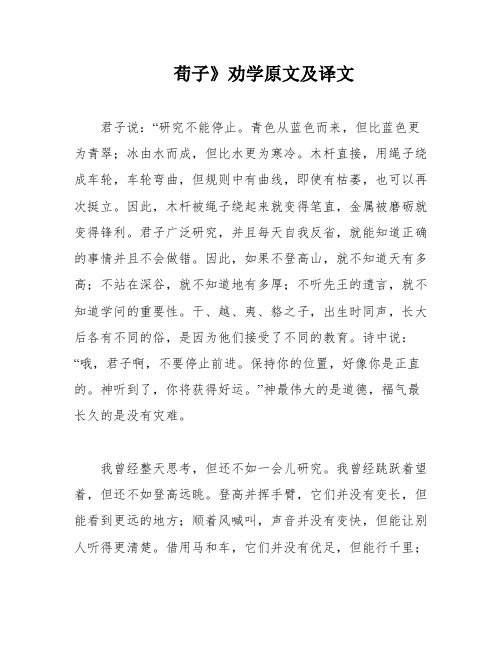
荀子》劝学原文及译文君子说:“研究不能停止。
青色从蓝色而来,但比蓝色更为青翠;冰由水而成,但比水更为寒冷。
木杆直接,用绳子绕成车轮,车轮弯曲,但规则中有曲线,即使有枯萎,也可以再次挺立。
因此,木杆被绳子绕起来就变得笔直,金属被磨砺就变得锋利。
君子广泛研究,并且每天自我反省,就能知道正确的事情并且不会做错。
因此,如果不登高山,就不知道天有多高;不站在深谷,就不知道地有多厚;不听先王的遗言,就不知道学问的重要性。
干、越、夷、貉之子,出生时同声,长大后各有不同的俗,是因为他们接受了不同的教育。
诗中说:“哦,君子啊,不要停止前进。
保持你的位置,好像你是正直的。
神听到了,你将获得好运。
”神最伟大的是道德,福气最长久的是没有灾难。
我曾经整天思考,但还不如一会儿研究。
我曾经跳跃着望着,但还不如登高远眺。
登高并挥手臂,它们并没有变长,但能看到更远的地方;顺着风喊叫,声音并没有变快,但能让别人听得更清楚。
借用马和车,它们并没有优足,但能行千里;借用船和桨,它们并不会游泳,但能穿越江河。
君子和普通人生来并没有不同,但他们善于利用周围的事物。
南方有一种鸟,叫做蒙鸠,用羽毛做巢,然后用发编织,系在芦苇和葦草上,当风吹来时,芦苇就会折断,蛋也会破裂,小鸟就死了。
巢并不是不完整,但所系的东西不可靠。
西方有一种树,叫射干,茎长四寸,生长在高山上,面对深渊,但树干并不能长得更高,只能生长在那里。
蒲草中长出蓬草,不用支撑也能直立;白沙中混杂着黑沙。
XXX变成XXX,渐渐地污染了它的周围,君子不接近,庶民也不服从。
这些事物本身并不丑陋,但它们的环境让它们变得如此。
因此,君子必须选择居住的地方,必须找到合适的人,以防止邪恶并接近中庸之道。
所有物品都有一个开始。
荣耀和耻辱是根据其品德而来的。
肉腐会生虫子,鱼枯会生虫蛀。
懒惰和忘记自己的身份会带来祸害。
如果强迫拿柱子,就会受到伤害;如果柔软地拿束,就会得到保护。
如果身上有邪恶,就会被怨恨。
《劝学》荀子原文
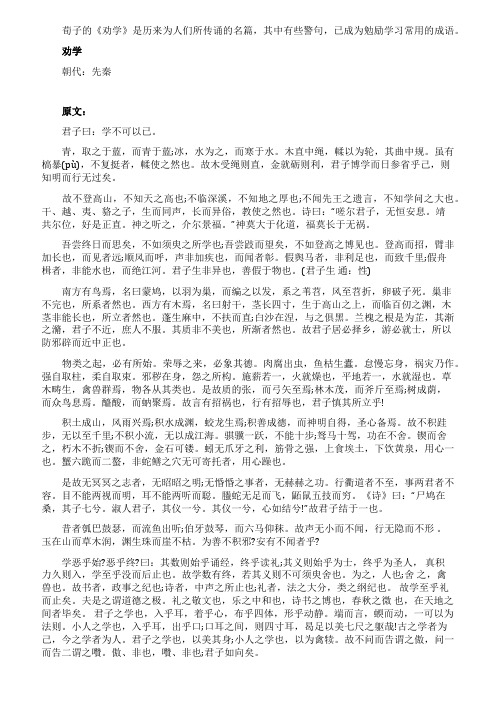
荀子的《劝学》是历来为人们所传诵的名篇,其中有些警句,已成为勉励学习常用的成语。
劝学朝代:先秦原文:君子曰:学不可以已。
青,取之于蓝,而青于蓝;冰,水为之,而寒于水。
木直中绳,輮以为轮,其曲中规。
虽有槁暴(pù),不复挺者,輮使之然也。
故木受绳则直,金就砺则利,君子博学而日参省乎己,则知明而行无过矣。
故不登高山,不知天之高也;不临深溪,不知地之厚也;不闻先王之遗言,不知学问之大也。
干、越、夷、貉之子,生而同声,长而异俗,教使之然也。
诗曰:“嗟尔君子,无恒安息。
靖共尔位,好是正直。
神之听之,介尔景福。
”神莫大于化道,福莫长于无祸。
吾尝终日而思矣,不如须臾之所学也;吾尝跂而望矣,不如登高之博见也。
登高而招,臂非加长也,而见者远;顺风而呼,声非加疾也,而闻者彰。
假舆马者,非利足也,而致千里;假舟楫者,非能水也,而绝江河。
君子生非异也,善假于物也。
(君子生通:性)南方有鸟焉,名曰蒙鸠,以羽为巢,而编之以发,系之苇苕,风至苕折,卵破子死。
巢非不完也,所系者然也。
西方有木焉,名曰射干,茎长四寸,生于高山之上,而临百仞之渊,木茎非能长也,所立者然也。
蓬生麻中,不扶而直;白沙在涅,与之俱黑。
兰槐之根是为芷,其渐之滫,君子不近,庶人不服。
其质非不美也,所渐者然也。
故君子居必择乡,游必就士,所以防邪辟而近中正也。
物类之起,必有所始。
荣辱之来,必象其德。
肉腐出虫,鱼枯生蠹。
怠慢忘身,祸灾乃作。
强自取柱,柔自取束。
邪秽在身,怨之所构。
施薪若一,火就燥也,平地若一,水就湿也。
草木畴生,禽兽群焉,物各从其类也。
是故质的张,而弓矢至焉;林木茂,而斧斤至焉;树成荫,而众鸟息焉。
醯酸,而蚋聚焉。
故言有招祸也,行有招辱也,君子慎其所立乎!积土成山,风雨兴焉;积水成渊,蛟龙生焉;积善成德,而神明自得,圣心备焉。
故不积跬步,无以至千里;不积小流,无以成江海。
骐骥一跃,不能十步;驽马十驾,功在不舍。
锲而舍之,朽木不折;锲而不舍,金石可镂。
- 1、下载文档前请自行甄别文档内容的完整性,平台不提供额外的编辑、内容补充、找答案等附加服务。
- 2、"仅部分预览"的文档,不可在线预览部分如存在完整性等问题,可反馈申请退款(可完整预览的文档不适用该条件!)。
- 3、如文档侵犯您的权益,请联系客服反馈,我们会尽快为您处理(人工客服工作时间:9:00-18:30)。
荀子-劝学篇-英文版荀子Hsun-TzuTranslated by Burton Watson劝学篇第一ENCOURAGING, LEARNING (SECTION 1) 君子曰:学不可以已。
青、取之於蓝,而青於蓝;冰、水为之,而寒於水。
木直中绳,輮以为轮,其曲中规,虽有槁暴,不复挺者,輮使之然也。
故木受绳则直,金就砺则利,君子博学而日参省乎己,则知明而行无过矣。
The gentleman says: Learning should never cease. Blue comes from the indigo plant but is bluer than theplant itself. Ice is made of water but is colder than water ever is •….If the gentleman studies widely and each day examines himself, his wisdom will become clear and his conduct be without fault.故不登高山,不知天之高也;不临深溪,不知地之厚也;不闻先王之遗言,不知学问之大也。
干、越、夷、貉之子,生而同声,长而异俗,教使之然也。
诗曰:「嗟尔君子,无恒安息。
靖共尔位,好是正直。
神之听之,介尔景福。
」神莫大於化道,福莫长於无祸。
If you do not climb a high mountain, you will not comprehend the highness of the heavens; if you do not look down into a deep valley, you will not know the depth of the earth; and if you do not hear the words handed down from the ancient kings, you will not understand the greatness of learning. Children born among the Han or Y eh people of the south and among the Mo barbarians of the north cry with the same voice at birth, but as they grow older they follow different customs. Education causes them to differ. The Odes says: Oh, you gentlemen, do not be constantly at ease and rest! Quietly respectful in your posts, love those who are correct and upright And the gods will hearken to youAnd aid you with great blessing.1There is no greater godliness2 than to transform yourself with the Way, no greater blessing than to escape misfortune.吾尝终日而思矣,不如须臾之所学也。
吾尝跂而望矣,不如登高之博见也。
登高而招,臂非加长也,而见者远;顺风而呼,声非加疾也,而闻者彰。
假舆马者,非利足也,而致千里;假舟楫者,非能水也,而绝江河。
君子生非异也,善假於物也。
I once tried spending the whole day in thought, but I found it of less value than a moment of study.3 I once tried standing on tiptoe and gazing into the distance, but I found I could see much farther by climbing to a high place. If you climb to a high place and wave to someone, it is not as though your arm were any longer than usual, and yet people can see. you from much farther away. If you shout down the wind, it is not as though your voice were any stronger than usual, and yet people can hear you much more clearly. Those who make use of carriages or horses may not be any faster walkers than anyone else, and yet they are able to travel a thousand li. Those who make use of boats may not know how to swim, and yet they manage to get across rivers. The gentleman is by birth no different from any other man; it is just that he is good at making use of things.南方有鸟焉,名曰蒙鸠,以羽为巢,而编之以发,系之苇苕,风至苕折,卵破子死。
巢非不完也,所系者然也。
西方有木焉,名曰射干,茎长四寸,生於高山之上,而临百仞之渊,木茎非能长也,所立者然也。
蓬生麻中,不扶而直;白沙在涅,与之俱黑。
兰槐之根是为芷,其渐之滫,君子不近,庶人不服。
其质非不美也,所渐者然也。
故君子居必择乡,游必就士,所以防邪辟而近中正也。
In the south there is a bird called the meng dove. It makes a nest out of feathers woven together with hair and suspends it from the tips of the reeds. But when the wind comes, the reeds break, the eggs are smashed, and the baby birds killed. It is not that the nest itself is faulty; the fault is in the thing it is attached to. In the west there is a tree called the yeh-kan. Its trunk is no more than four inches tall and it grows on top of the high mountains, from whence it looks down into valleys a hundred fathoms deep. It is not a long trunk which afford the tree such a view, but simply the place where it stands. If pigweed grows up in the midst of hemp, it will stand up straight without propping. If white sand is mixed with mud, it too will turn black.4 The root of a certain orchid is the source of the perfume called chih; but if the root were to be soaked in urine, then no gentleman would go near it and no commoner would consent to wear it. It is not that the root itself is of an unpleasant quality; it is the fault of the thing it has been soaked in.Therefore a gentleman will take care in selecting the community he intends to live in, and will choose men of breeding for his companions. In this way he wards off evil and meanness, and draws close to fairness and right.物类之起,必有所始。
荣辱之来,必象其德。
肉腐出虫,鱼枯生蠹。
怠慢忘身,祸灾乃作。
强自取柱,柔自取束。
邪秽在身,怨之所构。
施薪若一,火就燥也,平地若一,水就湿也。
草木畴生,禽兽群居,物各从其类也。
是故质的张而弓矢至焉;林木茂而斧斤至焉;树成荫,而众鸟息焉。
醯酸而蟥聚焉。
故言有招祸也,行有招辱也,君子慎其所立乎!Every phenomenon that appears must have a cause. The glory or shame that come to a man are no more than the image of his virtue. Meat when it rots breeds worms; fish that is old and dry brings forth maggots. When a man is careless and lazy and forgets himself, that is when disaster occurs. The strong naturally bear up under weight; the weak naturally end up bound.5 Evil and corruption in oneself invite the anger of others. If you lay sticks of identical shape on a fire, the flames will seek out the driest ones; if you level the ground to an equal smoothness, water will still seek out the dampest spot. Trees of the same species grow together; birds and beasts gather in herds; for all things follow after their own kind. Where a target is hung up, arrows will find their way to it; where the forest trees grow thickest, the axes will enter. When a tree is tall and shady, birds will flock to roost in it; when vinegar turns sour, gnats will collect around it. So there are words that invite disaster and actions that call down shame. A gentleman must be careful where he takes his stand.积土成山,风雨兴焉;积水成渊,蛟龙生焉;积善成德,而神明自得,圣心备焉。
